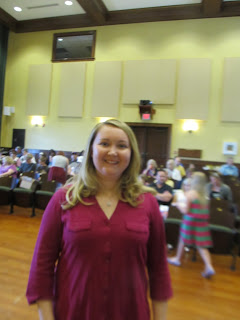Below you will find my Craft Tip from Diane Lockward's Poetry Newsletter, Oct. 2011. I highly recommend that you get your name on her email list to receive this Newsletter every month and also order a copy of her revised edition of The Crafty Poet. You can find more information on this site: http://www.terrapinbooks.com/the-crafty-poet-a-portable-workshop.html.
Diane has gathered together a trove of poems from which she has drawn prompts, followed by a Craft Tip by a well-known poet, including Cecilia Woloch, Baron Wormser, Dorianne Laux, and Lola Haskins. A second collection of prompts and poems will be published soon, The Crafty Poet, II.
Here's more about Diane at her website and her blog.
Sign up for her free monthly Poetry Newsletter and
visit Terrapin Books, her small press for poetry. I blurbed her latest book, The Uneaten Apples of Atonement, which I heartily recommend.
VOICE LESSONS
I grew up wanting to be a singer. I sang solos in church. I sang to the cows in the pastures. I sang quietly into the window of the bus as it made its long journey home from school every afternoon. Neither the window nor the cows gave me stage fright. Singing solo in church did. Would my voice be there? What would I hear? Anything at all? Remembering my anxiety as I opened my mouth to begin “In the Garden,”I recall Fred Chappell’s comment that the blank, mute page makes every honest writer feel a surge of doubt. Even opera singers confess to an occasional loss of voice that renders them unable to sing what was once their signature arias.
Like most young poets I worried about “finding my voice.” Now in middle age, after serving for five years as our state’s Poet Laureate, concentrating more on a public voice than my inner one, I now worry about finding it again.
Reading soprano Renee Fleming’s memoir The Inner Voice set me wondering about what advice she might give. Maybe she would tell me I ought to take this mystery of voice literally. Maybe I should try to think of voice as a real singer might. “Stop worrying about having lost your voice and start singing,” she suggested. “Try singing your own lines from earlier poems when you were ‘in voice,’ even if only as recitative and not aria. Really hear those lines, bodily, in every part of you “
“Oh, and by the way, sing along with the cd player while driving. If you keep punching back to a song numerous times because you love the way it feels in your ear and in your mouth, you are on to something important. Take the song that makes your hair stand on end and write from it, generating words that rise out of the song’s lyrics. “
So, ok, I took Renee’s imagined advice. On walks, I’d sing, quietly, lines from my poems, when I was sure nobody else was around. In the car I sang along with Etta James, Nina Simone, and even Renee herself on her Dark Hope album. Driving back over the Blue Ridge mountains, I listened to Dolly Parton’s version of “Silver Dagger” from her bluegrass collection. I listened to it over and over again, goose bumps rising on my arms every time, and when I got home, I began singing it onto the page, letting the first word of the song become the title.
Don’t
sing love songs to me
lest you waken the blade
that seeks marrow, my heart’s
muscle, bone-chain
that carries me deep
into shady groves where
I hear naught but my own
blood dissembling.
I hadn't a clue where this poem was going, where this woman’s voice was leading my own, but lead me it did. (You can find out where it carried me at Blue Fifth Review, where it’s just been published--http://bluefifthreview.wordpress.com.) ;
With the impetus of language that approximated the original lyrics, I suddenly heard wildflower names bursting through, along with words like “reft” and “dissembling” that I’d never used in a poem before. I heard --no, I felt my “voice” cracking the whip, a live wire again. Living as I do in the Blue Ridge mountains, I find that old ballads and folk songs wield special power for me, but jazz and blues do, too. I’m sure that Nina Simone’s “Lilac Wine” is waiting for a poem. Maybe “Vissi d’arte”? “Nessun dorma”?
Wait a minute, though. If I’m going to continue to think like a real singer, I have to practice don’t I? I can see Madame Fleming nodding her head, like my piano teacher, who once told me I didn’t practice hard enough. Thanks to newsletters like this one, suggestions for poetic practice aren't difficult to find. One of the best ideas I’ve heard lately, however, came from a renowned pianist who described his daily practice as playing the same Mozart sonata, finding something to learn from it each time. Why not come back each day to a poem that has stirred us, reading it aloud, learning it by heart, listening to its inner voice over and over again? Our own voices will respond to that voice, taking shape on the page, in our mouths, in our ears. After all, voices long to sing back to other voices. My inner Diva’s advice? Let them.
*********************
Here's Dolly singing her version of Silver Dagger, followed by Joan Baez, whose version I first heard many years ago. I still like that first haunting version the best.
https://www.youtube.com/watch?v=009vp-2bB84
https://www.youtube.com/watch?v=4Xlmb8gG7HU
WITHOUT THINKING TOO MUCH, CALL UP A SONG THAT GIVES YOU GOOSEBUMPS, THAT HAUNTS YOU, ONE THAT YOU WANT TO LISTEN TO AGAIN AND AGAIN. AFTER LISTENING TO IT AS MANY TIMES AS YOU WANT, FIND THE LYRICS AND LISTEN TO THEM IN YOUR OWN VOICE. BEGIN TO WRITE FROM WHAT HAUNTS YOU, LETTING THE LYRICS OF THE ORIGINAL POEM LEAD YOU ON….AND ON INTO YOUR OWN MUSIC.
RIGHT NOW I'M WORKING ON A POEM THAT IS ITSELF HAUNTED BY "THE DEMON LOVER," AS WELL AS ONE IN THE VOICE OF "PRETTY POLLY. "
She walks these hills in a long black veil
She visits my grave when the night winds wail
Nobody knows, nobody sees
Nobody knows but me
She visits my grave when the night winds wail
Nobody knows, nobody sees
Nobody knows but me
Long Black Veil
“She walks these hills in a long black veil,
visits my grave while the night winds wail...”
She could never herself weep
above any man’s grave for so many
bad nights, unmindful of hailstones
and wind wailings. Where’s the woman
who would? Still, she wonders who
wrote this song, who set it roaming.
She’s glad to be done with her own
bad nights drawing her out
where the wind can whip
even the slightest of lacy threads
wild at the edge of a shawl. She
had thought it was flesh to flesh
she wanted, long as the nights lasted.
That was before she pulled back
from the heat of him seeking her own
and saw limbs thrashing outside
like nothing that she could recall
ever hearing a woman sing.
No wailing romance in that vision,
only the locust leaves hammered
by lightning to quicksilver
tongue-shapes that silenced her.
How dare a woman walk out
into such revelation, much less
set it throbbing to music
that’s even now winding its song round her,
length after length of it, her hand
reaching out for the door handle?
first published in Poemeleon






















